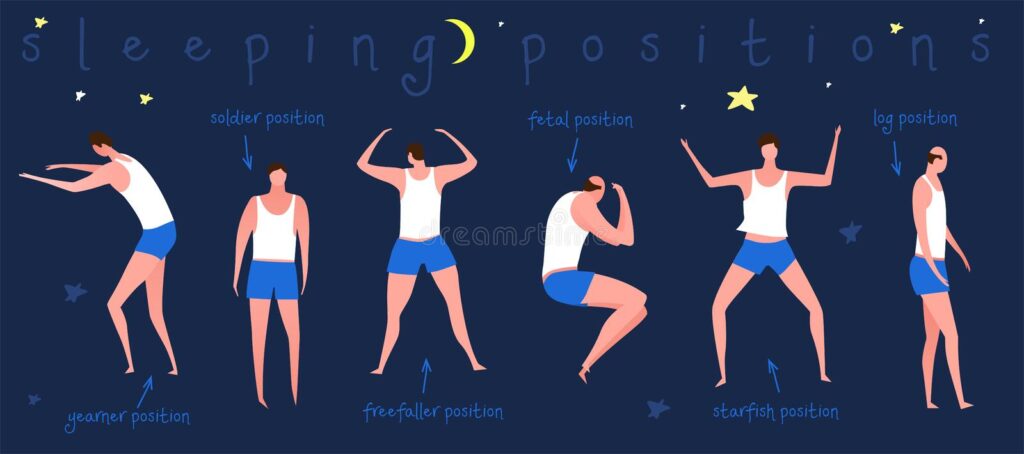What Does Your Sleeping Position Say About You?
You probably don’t read too much into your sleeping position. Still, your sleeping position says a lot about you, hinting at your personality and subtly revealing difficulties in getting comfortable due to injuries.
Some psychologists believe there are links between sleeping position and personality, although these opinions need a sprinkling of salt – the research behind personality traits and sleeping positions is limited.
Here’s what researchers say your sleeping position says about you:
2003 British study
The most publicised study is from 2003, conducted by Professor Chris Idzikowski, director of the Sleep Assessment and Advisory Service. Prof. Idzikowski analysed six sleep positions among 1,000 British adults. Here’s what he found:
Fetal position

Those who curl up in the foetus position are tough on the outside but sensitive inside, with women more likely to sleep in this position.
Log

Lying on your side with both arms down is associated with people who like to socialise and trust strangers but are also gullible.
The yearner

Lying on your side with both arms out means you are open-natured but don’t trust strangers without spending time with them.
Soldier

Lying on your back with both arms down suggests you are quiet and reserved, preferring to keep your thoughts to yourself.
Freefall

Lying on your tummy with your hands around your pillow suggests you are nervy, bold, and don’t like criticism or stressful situations.
Starfish

Lying on your back with your arms and legs sprawled out suggests you are attentive and caring and don’t like to be the centre of attention.
Do any of these personality traits match your own? If so, great! However, the 2003 study doesn’t account for age differences. We need to look at a newer Better Sleep Council (BSC) study for data covering this.
2017 American study
Research conducted by the Better Sleep Council (BSC) in 2017 looked at sleep differences through age, sleep, and sex, creating many links between sleeping positions, health, and how people of different ages sleep.
Here’s what the study found:
- Introverts are less likely to sleep on their stomach.
- Men are more likely to starfish than women.
- Women are more inclined to sleep in the same position.
- People who sleep in the foetal position have completed less education than those who sleep on their side.
- People who sleep in the log position believe they get enough sleep and feel healthier than those who sleep on their backs.
- Generation X and millennials prefer tummy sleeping to baby boomers, who like sleeping on their side.
Sleeping position and health
Sleeping on your back is considered the healthiest position because it protects the spine and uses gravity to keep it aligned, helping reduce pressure on your back.
If you can’t sleep on your back, side sleeping is the next best thing. Side sleeping keeps your spine aligned, providing your mattress is of a suitable firmness. The BSC study suggests people who sleep on their sides feel healthiest.
The worst sleeping position for health is tummy sleeping because your torso sinks and arches your spine, stretching it out of alignment.
Simply put, if you sleep on your back or side, you are unlikely to have backaches, but sleeping on your stomach can exasperate any problems. If you have a bad back, it’s worth sleeping on your back or side for optimal comfort.
Summing up
Your sleeping position might say something about you, but the studies suggesting it are based on small sample sizes and do not provide causation.
Side sleepers are said to be social and trusting, while back sleepers are reserved and understated. Front sleepers are said to be nervous and stressed, but this suggestion is at odds with my experiences (I’m a front sleeper, and I’m not nervous!).
Overall, don’t read too much into sleeping positions other than the foetal position – this can signify sensitivity and the need for comfort.

